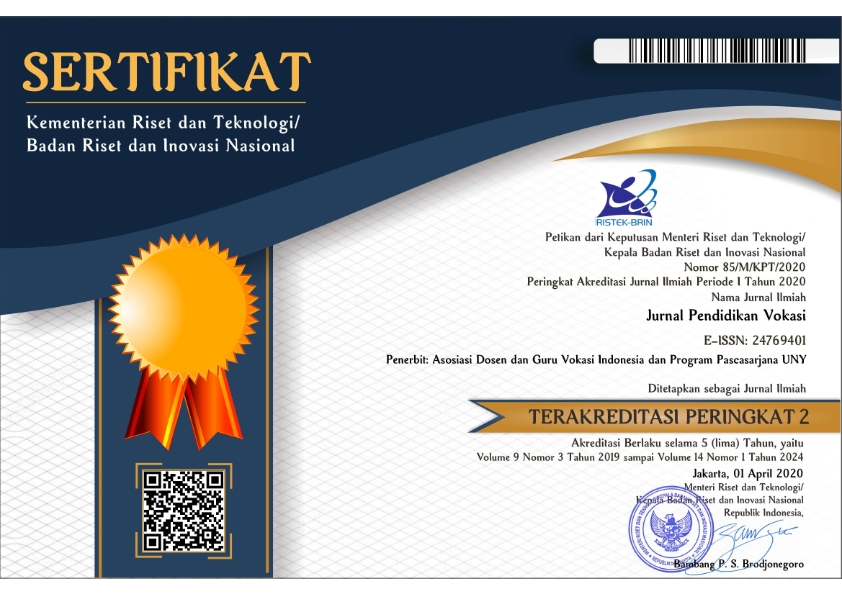Implementation of soft skills on Automotive Engineering practicum of state vocational high schools in West Lombok Regency
DOI:
https://doi.org/10.21831/jpv.v10i2.30594Keywords:
implementation, soft skills, vocational high schoolAbstract
This research aims to reveal the implementation of soft skills in the expertise program of automotive workshop at vocational high schools (VHS) in West Lombok Regency in terms of (1) student condition and practicum lesson planning, and (2) level of soft skills in automotive technology practicum of VHS students. This research is quantitative research with a descriptive approach. The research population is all state vocational high schools (SVHS) of light vehicle technology in West Lombok. The sample is four vocational high schools with 84 grade XII students and four teachers established using the purposive sampling technique. The research finding shows that (1) the student condition in the implementation of soft skills is in a good category with the achievement percentage of 46.43% and the lesson plan condition is in a good category with the achievement percentage of 58.33%; (2) the achievement level of soft skill is in a good category with the achievement percentage of 49%.
References
Adisusilo, S. (2012). Pembelajaran nilai-nilai karakter: Konstruktivisme dan VCT sebagai inovasi pembelajaran afektif. Raja Grafindo Persada.
Bhatnagar, N., & Bhatnagar, M. (2012). Effective communication and soft skills. Pearson.
Chaita, M. V. (2017). Developing graduate employability skills: Your pathway to employment. Universal.
Dahlan, D. (2009). Start young: Tips dan trik sukses di usia muda. PT Grasindo.
Dell'Aquila, E., Marocco, D., Ponticorvo, M., Di Ferdinando, A., Schembri, M., & Miglino, O. (2017). Educational games for soft-skills training in digital environments. Springer.
Department of National Education. (2004). Pengembangan kurikulum sekolah menengah kejuruan. Department of National Education, Republic of Indonesia.
Directorate General of Higher Education. (2008). Pengembangan soft skills dalam proses pembelajaran di perguruan tinggi. Directorate General of Higher Education of the Republic of Indonesia.
Esa, A., Selamat, A., Padil, S., & Jamaludin, J. (2014). Applications of soft skills in engineering programme at polytechnic Malaysia. Procedia - Social and Behavioral Sciences, 140, 115–120. https://doi.org/10.1016/j.sbspro.2014.04.395
Government Regulation No. 19 of 2005 on the National Standard of Education, (2005).
Helena, J., & Thomas, B. (2016). An investigation into the soft skills that employers in Zimbabwe expect graduate jobseekers to possess: A study of five companies under the Industrial Development Corporation of Zimbabwe (Limited) Group. Global Journal of Human Resource Management, 4(2), 1–20. http://www.eajournals.org/wp-content/uploads/An-Investigation-into-the-Soft-Skills-That-Employers-in-Zimbabawe-Expect-Graduate-Jobseekers-to-Possess.pdf
Hendricksen, D. (2012). 12 Essential skills for software architects. Pearson Education.
Hinchliffe, G. W., & Jolly, A. (2011). Graduate identity and employability. British Educational Research Journal, 37(4), 563–584. https://doi.org/10.1080/01411926.2010.482200
Johnson, D. W., Johnson, R. T., & Holubec, E. J. (2008). Cooperation in the classroom (8th ed.). Interaction.
Judiani, S. (2010). Implementasi pendidikan karakter di sekolah dasar melalui penguatan pelaksanaan kurikulum. Jurnal Pendidikan Dan Kebudayaan, 16(9), 280–289. https://doi.org/10.24832/jpnk.v16i9.519
Kartowagiran, B. (2018). Optimalisasi uji tingkat kompetensi di SMK untuk meningkatkan soft skill lulusan. Jurnal Dinamika Vokasional Teknik Mesin, 3(2), 101–109. https://doi.org/10.21831/dinamika.v3i2.21406
Lippman, L. H., Ryberg, R., Carney, R., & Moore, K. A. (2015). Key "soft skills" that foster youth workforce success: Toward a consensus across fields. Child Trends.
Ministry of Education and Culture. (2016). Revitalisasi pendidikan vokasi. Ministry of Education and Culture.
National Association of Colleges and Employers. (2018). Employers want to see these attributes on students' resumes. NACEweb.Org. https://www.naceweb.org/talent-acquisition/candidate-selection/employers-want-to-see-these-attributes-on-students-resumes/
Neff, T. J., & Citrin, J. M. (2010). Lesson from the top. Doubleddy Business.
Omar, M. K., Bakar, A. R., & Rashid, A. M. (2012). Employability skill acquisition among Malaysian community college students. Journal of Social Sciences, 8(3), 472–478. https://doi.org/10.3844/jssp.2012.472.478
Panuju, R. (2018). Pengantar studi (ilmu) komunikasi: Komunikasi sebagai kegiatan - komunikasi sebagai ilmu. Kencana.
Santrock, J. W. (2014). Educational psychology (5th ed.). McGraw-Hill Education.
Sudira, P. (2016). TVET abad XXI: Filosofi, teori, konsep, dan strategi pembelajaran vokasional. UNY Press.
Sutrisno, B. (2016). Profil model pembelajaran soft-skill pada SMK bidang Ekonomi di Surakarta (Kajian aspek apa; mengapa; dan bagaimana). Jurnal Pendidikan Ilmu Sosial, 26(2), 115–135. https://doi.org/10.2317/jpis.v26i2.3354
Widarto, W., Pardjono, P., & Widodo, N. (2012). Pengembangan model pembelajaran soft skills dan hard skills untuk siswa SMK. Jurnal Cakrawala Pendidikan, 31(3), 409–423. https://doi.org/10.21831/cp.v0i3.1139
Downloads
Published
How to Cite
Issue
Section
License
The authors submitting a manuscript to this journal agree that, if accepted for publication, copyright publishing of the submission shall be assigned to Jurnal Pendidikan Vokasi. However, even though the journal asks for a copyright transfer, the authors retain (or are granted back) significant scholarly rights.
The copyright transfer agreement form can be downloaded here: [JPV Copyright Transfer Agreement Form]
The copyright form should be signed originally and sent to the Editorial Office through email to jpvokasi@uny.ac.id
Jurnal Pendidikan Vokasi by http://journal.uny.ac.id/index.php/jpv is licensed under a Creative Commons Attribution-ShareAlike 4.0 International License.














